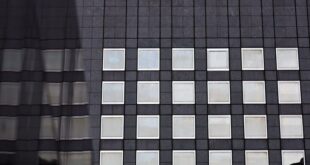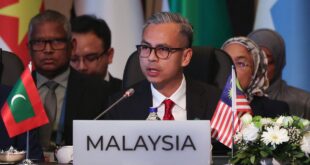Sam Bankman-Fried’s words in tweets and group chats are being used as evidence against him in his historic fraud trial.
Screenshots of messages, social media posts and internal documents have been presented by prosecutors to demonstrate how the 31-year-old allegedly orchestrated a multibillion-dollar scheme at his FTX cryptocurrency exchange, along with his trading firm Alameda Research. The documents offer a look into the mechanics of his alleged fraud as well as the discrepancies between his public statements and private instructions to his inner circle.
Former colleagues – including Caroline Ellison and Gary Wang – gave jurors insight on how to decipher the documents during their testimony at the federal courthouse in New York.
Prosecutors also played audio clips from a secretly recorded meeting of Ellison with Alameda employees in Hong Kong in the final week of the trading firm’s collapse. Asked who made the decision to repay Alameda lenders with FTX customer funds, Ellison uttered, “Sam, I guess.”
All-hands meeting recording
In audio clips from a Nov 9, 2022, Alameda all-hands meeting – days before the company filed for bankruptcy – Ellison spoke about the firm’s troubles and told them it was likely to shut down. “The basic story here is that starting last year, Alameda was kind of borrowing a bunch of money via open-term loans and used that to make various illiquid investments,” she said on the tape. In cross-examination, Ellison was asked if she was admitting wrongdoing to the employees. “Yes, I was,” she said. While Alameda employees seemed upset about the wrongdoing, they were grateful she had been open and honest with them, she said. A former Alameda software engineer, Christian Drappi, told the court that Ellison was laughing nervously during the meeting.
Seven balance sheets
In June 2022, as crypto prices spiralled, Alameda’s lenders were calling in their loans. Ellison said Bankman-Fried directed her to prepare “alternative” balance sheets in response to a request for financial information from one of its lenders, Genesis. “I understood him to be directing me to come up with ways to conceal things in our balance sheet that we both agreed would look bad,” she testified. She came up with seven potential versions, and Bankman-Fried picked “Alt 7” which would conceal Alameda’s large borrowing from FTX customers. The exhibits show the main balance sheet with seven additional tabs for each alternative.
The balance sheet “alt 7” was eventually sent to Genesis. In this version, the item “exchange borrows” – referring to the US$9.9bil (RM46.81bil) Alameda was borrowing from FTX – was removed. It also cut Alameda’s liabilities from US$15bil (RM70.93bil) to around US$10bil (RM47.28bil). Ellison testified that the document was “dishonest.”
Gary Wang code
Gary Wang, FTX-co-founder and long-time friend of Bankman-Fried, testified that Alameda Research had a US$65bil (RM307.35bil) line of credit on FTX, one of the ways that allowed the trading firm to misappropriate FTX customer funds. The exhibit below shows that under the column “borrow,” Alameda’s main trading account had the ability to borrow up to US$65,355,999,994 (RM309bil) from the exchange. The figure was set so high that it meant Alameda was able to make nearly unlimited withdrawals from FTX.
Furthermore, Wang, who went to MIT with Bankman-Fried, testified that his old friend had asked for an “allow negative” balance feature to be added for Alameda, and another former FTX executive, Nishad Singh, implemented the code change. This allowed Alameda to withdraw more funds than it actually had, one of the ways for it to misappropriate FTX customer funds. The exhibit below shows that this feature was added in July 2019 – only a few months after FTX was founded.
Padel tennis
Adam Yedidia, another Massachusetts Institute of Technology alum who went to work at FTX, was one of the nine people living and socialising in a luxury penthouse shared with Bankman-Fried in the Bahamas. Prosecutors showed a photo of them dining to demonstrate their close-knit relationship in both professional and personal settings. He testified that in June 2022, Bankman-Fried told him “We were bullet proof last year. We’re not bullet proof this year,” when asked about the financial health of FTX. The conversation occurred at a padel tennis court in The Albany, the luxury resort where they resided, Yedidia said.
‘People of the House’ group chat
Yedidia said the 10 people, including Bankman-Fried, Ellison, Wang and Singh, who lived together shared a Signal chat group called “People of the House.” The exhibit shows that when Yedidia and others raised concerns about the rent, Bankman-Fried replied he’s been “assuming that it’s basically just Alameda paying for it in the end.” The response went straight in to the heart of the prosecution’s case that Bankman-Fried was using Alameda’s money – misappropriated from FTX customer funds – to fund his expensive lifestyle.
Paradigm emails
Part of the government’s case is that Bankman-Fried not only deceived customers, but also venture capital investors who fueled his rapid ascent. Matt Huang, managing partner at crypto VC firm Paradigm, testified his firm raised concerns about FTX’s corporate governance, including its relationship with Alameda, before investing in the crypto exchange. He said Bankman-Fried reassured them there was no preferential treatment for Alameda.
Alameda shutdown
Bankman-Fried considered closing Alameda Research in September 2022, following publicity concerns about conflicts of interest between the two, Wang testified. The exhibit shows Bankman-Fried’s personal note, before he ultimately decided that he couldn’t shut down the hedge fund because it had accessed and spent so much of FTX customers’ funds that it would not be able to repay them, Wang said. The document shows that Bankman-Fried was fully aware of the reputational damage that would occur if the tangled relationships between Alameda and FTX came to light.
Things Sam freaks out about
Ellison testified that she kept several Google docs on her to-do list and priorities. In the exhibit below, she wrote about “things Sam is freaking out about,” including hedging Alameda’s portfolio risks. The document showcases Bankman-Fried’s own worries about Alameda’s financial position. Mark Cohen, Bankman-Fried’s lawyer, argued in his opening statement that Bankman-Fried had become concerned about dramatic fluctuations in crypto prices months before Alameda’s bankruptcy and urged Ellison to hedge their exposure to further losses, but she didn’t do it.Fourth on the list was “getting regulators to crack down on Binance.” Bankman-Fried believed a crackdown on Binance, the largest crypto exchange and an FTX competitor, would be the best way for FTX to gain market share, she said.
Offer to buy FTT at US$22
Following the publication of a leaked Alameda Balance sheet by CoinDesk, Binance CEO Changpeng Zhao posted on Twitter that his exchange had decided to liquidate any FTT – FTX’s own crypto token – on its books “due to recent revelations that came to light.” Behind the scenes, top Alameda employees had become increasingly desperate as they tried to stabilize the FTT token price and meet withdrawal demands from FTX customers. The exhibit shows internal discussion at Alameda that led to Ellison’s Twitter post that Alameda would be willing to buy all of Binance’s FTT for US$22 (RM104) per token.
Ellison and Bankman-Fried chat history
In the week of Alameda’s and FTX’s collapse, Ellison confessed to Bankman-Fried that she had an “increasing dread of this day that was weighing on me for a long time, and now that it’s actually happening it just feels great to get it over with one way or another.” When asked to read out her message on the stand, Ellison broke down crying. She explained that the emotional burden of carrying on Alameda’s lies had become unbearable in the months leading to the collapse. “That was overall the worst week of my life,” she said on the stand. Ellison and Bankman-Fried never met after that. – Bloomberg
 BeritaKini.biz Berita Viral Terkini di Malaysia
BeritaKini.biz Berita Viral Terkini di Malaysia





